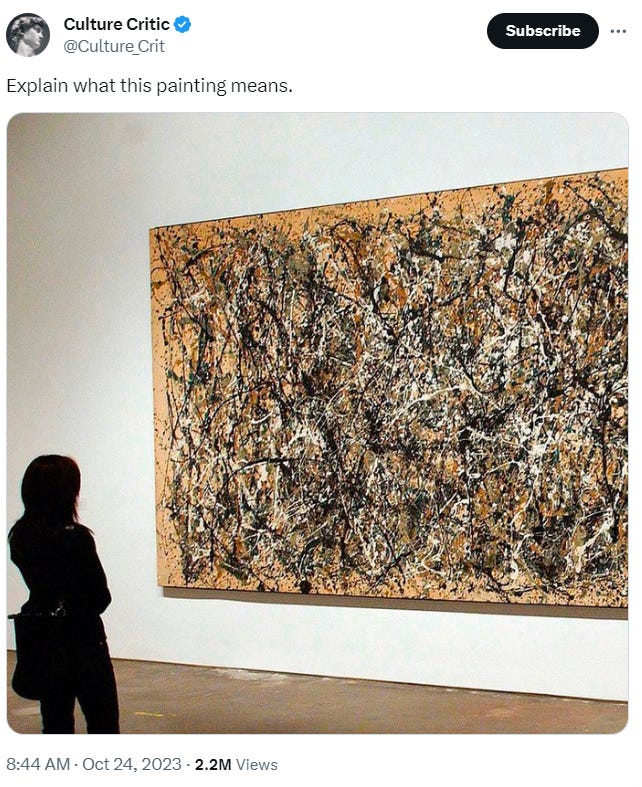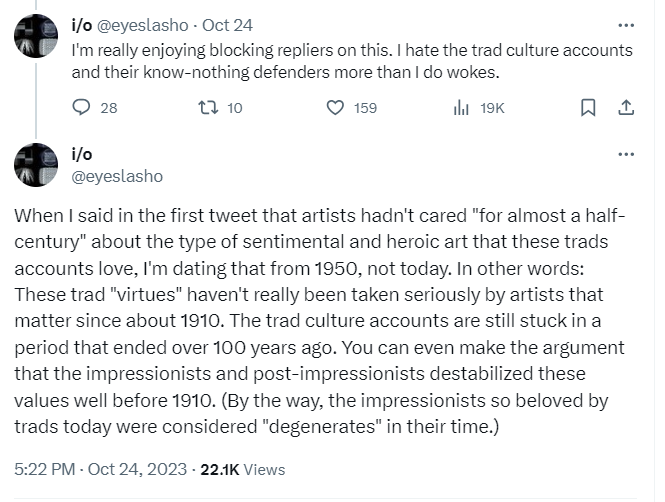The Meaning of Modern Art
I’m quite a fan of Twitter personality Culture Critic. Above all, I enjoy his creative positivity. He doesn’t just showcase great art and architecture; most of what he showcases is actually new to me. Still, as you might expect, Culture Critic occasionally lashes out at not-so-great art and architecture, especially when the gap between its status and its merit is wide. A recent example:
To which i/o, another insightful Twitter personality, responded:
I agree that this is a plausible story about what mid-century painters meant to express with their art. But i/o’s response raises a list of further puzzles.
History is packed with horrific bloodbaths in the same ballpark as World War II and the Holocaust. Yes, the total body counts were usually smaller when global population was lower. But why would any historically literate person sharply revise their view of the human condition after the horrors of the 40s? The story changes if you were personally traumatized; losing your child is devastating even though you know than such things happen in general. Otherwise, though, if you weren’t a metaphysical pessimist before 1940, you shouldn’t have been one in 1945.
There’s a strong insinuation that thoughtful people should take artists’ broad attitudes seriously. So seriously, in fact, that if artists change their attitude, so should the rest of us. Stated baldly, however, this is absurd. Artists are infamously neurotic and emotional. “Mid-wits” are reliable by comparison, even though they are, by definition, less than stellar.
Since 1945, incredibly good things have happened on Earth. Living standards have skyrocketed. Health sharply improved. The Soviet bloc collapsed. Population rose. The internet made the totality of human knowledge and the human experience available to almost everyone on Earth for a price near zero. I daresay these marvels outweigh World War II and the Holocaust. If the latter events justify a rejection of “sentimental and heroic scenes,” why don’t the subsequent events justify a full-throated re-acceptance of such scenes?
For further context, i/o adds:
Now I’m really confused.
Since I strive to avoid hating anyone, I don’t hate wokes. But I can easily see why others would hate them for their absurd self-righteous dogmas. Why, though, would the fact that someone disdains most modern art and adores earlier art cause any reaction stronger than bemusement?
Again, the fact that artists don’t “take X seriously” seems like painfully weak evidence for X. I doubt that even artists themselves consider their occupation especially reliable. Why should anyone else defer to them?
If you read i/o’s non-art posts, he plainly believes that social science has gotten worse over time. Defenders of the status quo could accuse him of being “stuck in a period that ended over 30 (50?) years ago. Which shows that the word “stuck” begs the question. In the world of ideas — which includes the arts — there is only weak pressure for objective quality. Fads thrive by insider acclaim. While this doesn’t show that any specific trend is a deprovement, the savvy observer will remain highly open to this possibility.
Bottom line: Culture Critic asks a good question. i/o offers a good answer, which in turn leads to further questions that undermine the significance of that answer. Call me a midwit if you must!





Meaning is overrated. I visited the Metropolitan many years ago and stood before that painting by Pollack. It's large, impressive, it has a mesmerizing quality if you're open to seeing it as a singular work by an interesting artist and human being.
There is a photo that always chills me, and it is the picture from outside the Auschwitz camp in Poland. You see a single line of railroad track that goes straight through the tower of the outer building. Without context, this picture insignificant. Knowing what it is you are seeing and why it exists gives it a unique presence.
Meaning is something we treat like a sample tray that can passed around for every one to have their fill. Context is more personal, and I would say more relevant than meaning. Or, as Michel de Montaigne said: "What hits you affects you and wakes you up more than what pleases you."
Art doesn't have to have meaning. Sometimes, it's just pretty to look at.